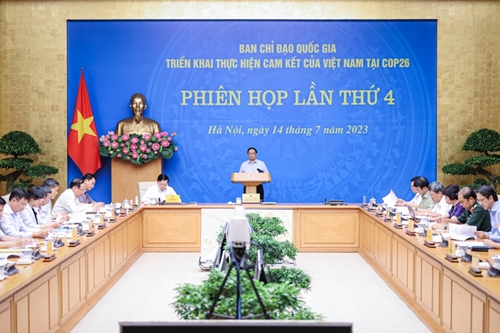Under Decision No.1732/QD-TTg dated August 12, 2025, which took effect the same day, PM Pham Minh Chinh will serve as head of the committee, with Deputy Prime Minister Tran Hong Ha as deputy head.
    |
 |
|
Prime Minister Pham Minh Chinh chairs the fourth meeting of the national steering committee for the implementation of Vietnam’s commitments at COP26. |
The committee's members include Acting Minister of Agriculture and Environment Tran Duc Thang; Minister - Chairman of the Government Office Tran Van Son; Minister of Finance Nguyen Van Thang; Minister of Industry and Trade Nguyen Hong Dien; Minister of Construction Tran Hong Minh; Minister of Health Dao Hong Lan; Minister of Science and Technology Nguyen Manh Hung; Minister of Education and Training Nguyen Kim Son; Governor of the State Bank of Vietnam Nguyen Thi Hong; Chief of the General Staff, Deputy Minister of National Defense Gen. Nguyen Tan Cuong; Deputy Minister of Public Security Se. Lt. Gen. Pham The Tung; Deputy Minister of Foreign Affairs Dang Hoang Giang; Deputy Minister of Justice Nguyen Thanh Tinh; Deputy Minister of Home Affairs Nguyen Manh Khuong; President of the Vietnam Academy of Science and Technology Chau Van Minh; and Chairman of the Vietnam Chamber of Commerce and Industry Pham Tan Cong.
The Ministry of Agriculture and Environment will act as the committee’s standing agency, using its existing apparatus to carry out assigned tasks. The Minister of Agriculture and Environment will head a working team, comprising department-level leaders from relevant ministries and agencies to assist the steering committee, while issuing working regulations for the team's operations.
The steering committee will direct and coordinate to help the Government and the Prime Minister in implementing Vietnam's COP26 commitments, strengthen inter-ministerial and local climate response efforts, and foster cooperation with international organizations, development partners, and other countries.
It will also oversee the review and refinement of policies, laws, strategies, and plans, promote administrative reforms to create a favorable investment environment, and mobilize financial and technological support for climate adaptation, development model transformation, and energy transition.
The steering committee will guide priority programs and projects, and resolve administrative and inter-agency bottlenecks to accelerate the implementation of administrative procedures for investors.
Source: VNA